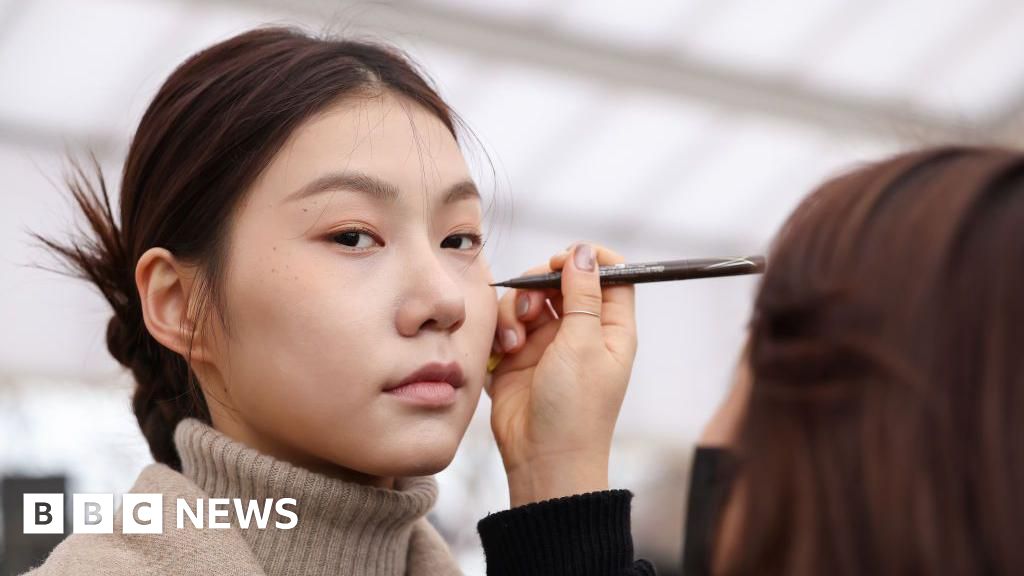生成中...【新闻趣读】特朗普关税大棒砸向韩国美妆!美国"K-beauty"迷妹们慌了神,囤货速度比双十一还疯狂。15%的关税虽然比威胁的25%温柔了些,但已经让美妆店主们提前进入"备战状态"——小本经营的亚马逊卖家可能要哭晕在厕所,而真爱粉们则表示:"涨价算什么?我的脸可比钱包金贵!"(友情提示:想买韩妆的小仙女们,现在囤货还来得及,毕竟蜗牛粘液面膜可不会自己爬到你脸上)
---
How South Korea's K-beauty industry is being hit by Trump tariffs
特朗普关税如何冲击韩国美妆产业
1 day ago Share Save Osmond Chia Business reporter, BBC News Reporting from Singapore Share Save
1天前 分享 保存 BBC商业记者Osmond Chia新加坡报道 分享 保存
Getty Images
盖蒂图片社
Cars and smartphones may rank among South Korea's biggest exports to the US, but few goods inspire a more devoted following than the Asian country's beauty products. K-beauty - a term that covers a wide range of skincare, makeup and cosmetics from South Korea - is lauded for its quality and value, driving soaring demand in recent years. The global appeal of South Korean culture has also helped propel the popularity of its cosmetics. US-based Pearl Mak tells the BBC that she was introduced to K-beauty products by her friends. South Korean serums are better-suited for her skin compared to some Western brands that tend to be more harsh, the 27-year-old graphic designer says. Now"95% of my skincare is made up of K-beauty products", she adds. Ms Mak is not alone in her preference for South Korean skincare brands. Americans spent as much $1.7bn (£1.3bn) on K-beauty products in 2024, according to industry estimates. That marks a more than 50% rise compared to the previous year. K-beauty products are often more attractively priced than their Western counterparts - but also feature ingredients that are not as commonly found in the West - from heartleaf to snail mucin. US President Donald Trump has now imposed a 15% import tax on South Korean goods traded between Seoul and Washington. It's less than the 25% levy that Trump had threatened, but many consumers are not taking any chances.
汽车和智能手机虽是韩国对美出口主力,但没有什么比该国美妆产品更让消费者狂热。"K-beauty"涵盖各类韩国护肤品和彩妆,近年因质优价廉需求激增。韩流文化也助推了其化妆品流行。美国平面设计师Pearl Mak表示韩国精华比某些刺激性强的西方品牌更适合她的肌肤,如今她95%的护肤品都是韩妆。行业数据显示2024年美国人在K-beauty上豪掷17亿美元,同比增超50%。从心叶草到蜗牛粘液,韩妆成分在西方较为罕见。特朗普总统虽将对韩关税从威胁的25%降至15%,但许多消费者仍不敢掉以轻心。
US K-beauty retailer Santé Brand saw orders spike by nearly 30% in April, right after Trump unveiled sweeping US import taxes on most of the world."When the tariff announcements hit, customers got strategic with how they were going to weather the storm," Santé Brand's founder Cheyenne Ware told the BBC."Consumers are preparing against the uncertainty." Another K-beauty retailer, Senti Senti, has been ordering more products since Trump started his tariff threats, says manager Winnie Zhong. This week, she received alerts from suppliers urging retailers to"stock up before tariffs". Both retailers said prices of K-beauty products are likely to increase as the levies push up costs across the industry."Anyone telling you prices will stay flat through the next two years is naive," says Ms Ware. Prices are bound to rise, especially for smaller sellers of beauty products on platforms like Amazon, who operate with slim profit margins, economist Munseob Lee from the University of California San Diego says. Despite higher prices, the global popularity of South Korean culture means K-beauty products are likely to remain in demand in the US, he says."Casual buyers might be turned off by the higher price, but fans won't find an easy substitute." Ms Zhong agrees. She thinks customers will still want to buy K-beauty products but price rises may mean they purchase fewer items than before. Higher prices are unlikely to stop Ms Mak buying her favourite products."It depends on how much the price shoots up, but as of now, I am willing to pay more to purchase the same products," she says.
特朗普公布全球关税后,美国K-beauty零售商Santé Brand四月订单激增近30%。创始人称消费者开始"战略囤货"应对不确定性。另一家零售商Senti Senti自特朗普发出关税威胁就加大采购,本周更收到供应商"趁涨价前囤货"的提醒。两家零售商均表示行业成本上升将推高售价,创始人Ware直言"认为未来两年价格不变太天真"。经济学家指出亚马逊等平台的小卖家因利润微薄受影响最大,但韩流热度意味着核心粉丝不会轻易转向。零售商Zhong认为消费者会减少购买量而非放弃,忠实用户Mak则表示愿为心头好买单。
'No easy substitute'
"无可替代"
Big K-beauty brands are in a much better position to absorb the cost of tariffs than their smaller rivals, says South Korea-based business consultant Eyal Victor Mamou. These larger companies will be able to avoid major price rises for their customers as they have higher profit margins, he says. But smaller K-beauty firms that make their products in South Korea will struggle to keep a lid on costs, Mr Mamou adds."It will take some time to take effect since most goods being sold in the short-run have already been commissioned at current prices, but we'll see it play out soon."
商业顾问Mamou指出大品牌因利润率高更能消化关税成本,而韩国本土小企业则难控制成本。虽然现有库存会延缓涨价效应,但影响很快显现。
Getty Images The global appeal of K-beauty products has been driven by the popularity of South Korean culture
盖蒂图片社 韩流文化助推K-beauty全球风靡

